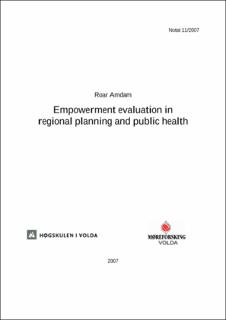Empowerment evaluation in regional planning and public health
| dc.contributor.author | Amdam, Roar | |
| dc.date.accessioned | 2024-01-30T13:35:09Z | |
| dc.date.available | 2024-01-30T13:35:09Z | |
| dc.date.issued | 2007 | |
| dc.identifier.issn | 0805-8075 | |
| dc.identifier.uri | https://hdl.handle.net/11250/3114528 | |
| dc.description.abstract | Empowerment is an overall goal for the public health work and for the HEPRO project as a policy program with the mission to stimulate sustainable public health in the Baltic Sea Region. In my previous papers to the HEPRO meetings the governance turn in public health is discussed and the empowerment planning is put forward as an adequate approach to public health work. In these papers public health work is regarded as a policy making process based on governance structures in the form of partnership between public, private and voluntary sectors and between levels of government. Further the empowerment planning approach is regarded as an appropriate approach to empowerment in organisations and regions if the planning approach is designed to stimulate the different variables in a development process. In this paper I shall discuss to what extent the ten principles of empowerment evaluation can become a guide in setting up a learning process and how the principles can stimulate the learning process within an empowerment planning approach to public health work. | en_US |
| dc.language.iso | nno | en_US |
| dc.publisher | Høgskulen i Volda | en_US |
| dc.relation.ispartofseries | Notat;11/2007 | |
| dc.title | Empowerment evaluation in regional planning and public health | en_US |
| dc.type | Working paper | en_US |
| dc.source.pagenumber | 21 | en_US |
| dc.source.journal | Skriftserien | en_US |
Tilhørende fil(er)
Denne innførselen finnes i følgende samling(er)
-
Notat [206]
